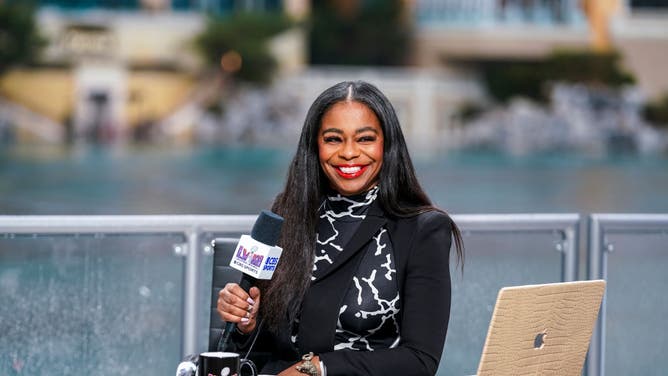Josina Anderson's Draft Night Race Bait Was Beneath Her | Bobby Burack
While the sports media spent the weekend blaming racism for Shedeur Sanders falling to the fourth round of the draft, former ESPN reporter Josina Anderson took issue with the entire coverage of the draft.
"No African-American women on the NFL Draft coverage?" Anderson observed with obvious disgust.
Anderson's post has been the target of a good deal of mockery, including by the author of this article. However, on a more serious note, Anderson's gripe underscores the consequences of the DEI mind virus that infected so many members of the media.
In Anderson's mind, black women are owed a spot on every broadcast. They aren't. No one is.
Name any broadcast on television, and at least one group is missing – if not many, many more.
Take the NBA playoffs, for example. ESPN's draft coverage, the subject of Anderson's criticism, led directly into its coverage of the NBA playoffs, where every featured commentator was, wait for it, black.
Take a look:
Now, let's examine Monday's edition of "First Take," ESPN's most promoted daily studio show:
Upon review, there were three commentators who appeared. All three were black men.
Elsewhere, ESPN recently announced its coverage plans for the upcoming WNBA season. Again, the main studio desk will feature Elle Duncan, Chiney Ogwumike, and Andraya Carter—all of whom are black women.
We could go on and on, and on. Somewhere, there might even be a show on television featuring—gasps—an all-white male crew. We haven't found one, but it might exist somewhere on the dial.
Maybe. Probably not. Either way, you get the point.

LAS VEGAS - February 5: CBS Sports HQ MIDDAY RUNDOWN on Monday, February 5, 2024 at the Bellagio for Super Bowl LVIII. Pictured: Josina Anderson. (Photo by Mary Kouw/CBS via Getty Images)
Now, there are specific instances where a certain group can provide value to the discussion. Given the conversations surrounding Caitlin Clark, it'd make sense to include at least one white player on set to speak from the experience of playing in a majority-black league. (Apparently, ESPN disagrees.)
We'd also argue that if a mainstream sports network is going to discuss a political topic, it owes it to the viewers to include at least one commentator with a different perspective. (Again, apparently, ESPN disagrees.)
But the draft is not one of those instances. At ESPN, the main desk featured Mike Greenberg as host, Booger McFarland as a former player, Louis Riddick as a former scout, and Mel Kiper Jr. as the most renowned (at least until this week) draftnik.
Who exactly does Anderson think should be removed in place of a black woman?
And therein lies why her comments were so disappointing.
She seemingly tried using race and gender--her race and gender--to pressure executives into giving her a spot on the draft next year. That's gross. That should make the executive not want to work with her.
What's more, Josina Anderson didn't need to stoop to this level. She is a real reporter, with real contacts, with a real résumé. I was the first person to argue publicly that ESPN downgraded its reporting by replacing Anderson with some random blogger named Kimberley A. Martin.
Josina is not some race idolater--like Jemele Hill or David Dennis Jr.--who provides no other value than giving white executives cover by employing them to spew racial hysteria.
In fact, Anderson reported significant news during the draft. Per Anderson, the Pittsburgh Steelers communicated with Aaron Rodgers that they'd like to receive a decision about his future within the next 48 hours.
No other reporter had that. Not even Adam Schefter or Ian Rapoport.
Unfortunately, the report went mostly unnoticed because of how big a fool Anderson made herself look hours prior. Put simply, she undermined her own reporting by resorting to the same (race) card that has cost so many in the industry their credibility.
Sincerely, we hope Josina stops acting like she is owed a seat at the table because she is a black woman, and gets back to proving it as a reporter.